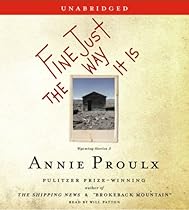
I listened to these stories in my car, on my CD player. I think the impression a book has can vary significantly depending on how it is "read", and in this case the audio version may not have been my best choice.
Fine Just the Way It Is is a set of short stories, specifically Wyoming Stories, as its subtitle says. The stories take place in the frontier days, in the present time, and in between. They vary in specific location, in the length of the tale and in the characters. But they are all about Wyoming, as if no matter who the human character is he or she cannot shake the indelible control of Wyoming on its soul. Oh, and I don't use that term "soul" lightly. Three of the stories feature the devil him- or herself.
It's possible that the actors on Selected Shorts have spoiled me for the usual professional readers of audio books. I love to listen to Selected Shorts on public radio, to how these veteran actors read fascinating stories, bringing every one to life. During one visit to New York City I could hardly contain my excitement the night I made my way to Symphony Space to watch the actors live, and I know I would go there regularly if I lived in Manhattan.
The readers of audio books are good readers, highly qualified, yet often for me there is no good fit between them and the material - or perhaps I am simply prejudiced. I found it difficult in the present case to get comfortable with the accent and style of speaking of Will Patton. Patton was chosen, I am sure, because these stories take place in Wyoming, and he has a decidedly western accent. Beyond the accent, he places emphasis where it might be natural for a westerner. He immerses himself into these lives and it shows and yet my prejudice, from wherever it comes, against that type voice, made it difficult at all times to enjoy the stories.
Nevertheless some of these stories stood out for me. They nearly stopped me in my tracks. There is a story here of a sagebrush that takes the place, for one woman, of a child, after she has lost so many of her own human children. The sage is of such a shape that it reaches its "arms" to the sky and it is so well treated that it reaches an astonishing size. It becomes a legend in its territory. It even becomes the subject of mysterious disappearances.
Another story, near the end, is of a man and woman who get into a fight, escalating until neither can back down. The man leaves, the woman heads out the next day for a long hike, one she had intended to do with the man. She hikes past a sign that says "trail closed" and continues on, knowing she is likely to be on her own the entire way, yet keeping in mind that her former lover might see the signs and come after her. When she makes a mistake and gets caught in some rocks we get to know how each day, each hour, each minute feels for her. And how her mind goes back to that fight.
There are several long stories here, each of which I wanted to be a book in itself. The first one left me long before I was ready to go. In fact, when I realized I was listening to a batch of short stories and not one long one I initially felt cheated, because I wanted so much for that first one to continue. Would I have the same impression if I simply came to the last paragraph of a printed page? I am not sure. Perhaps in some ways audio does have an advantage (in addition to being able to occupy my mind while I travel).
These are earthy, real, unwincing stories of the west, spanning several generations. People live and die and have hard lives and we are treated to details you almost had to be there to know. Better than any history book, this set brings the west, the real west, truly alive. The details are inscribed in the faces we imagine, in the actions the characters take, in the sense of relentless fate that seems to weigh everything down. Overall, the stories feel uncomfortably real while at the same time are frequently relieved by what may be called a kind of Wyoming humor.
No comments:
Post a Comment